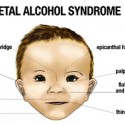Fetal alcohol exposure affects teenage drinking behavior
According to scientists, there is a link between exposure to alcohol in the womb and an attraction to its smell during teenage life.
The researchers state that a fetus can recall and be drawn to odor stimuli from what its mother ingests during pregnancy.
A new study from the State University of New York found that the offspring of rats given alcohol through their pregnant mothers were drawn to the smell of alcohol when they grew to adolescence.
The researchers gave pregnant rats, a diet supplemented with ethanol or water. They then tested their kids when they were adolescents and adults. Rats that had fetal exposure to alcohol were more likely to follow intoxicated peers and were more drawn to the smell of ethanol than their water-fed counterparts. This reinforces the fact that pre-natal exposure makes children more attracted to alcohol, increasing alcoholic tendencies in them when teenagers, with the effects sometimes lasting a lifetime.
Steven Youngentob, who led the study, said: “These results highlight an important relationship between fetal and adolescent experiences that appears essential to the progressive development of alcohol abuse.”
According to researchers, an expectant mother’s diet determines her unborn baby’s sense of smell. They believed that being exposed to alcohol in the womb trains the brain to make the smell of liquor more appealing. Although the experiment was on rats, the team believes, it has a clear relevance to human beings. The authors wrote that this is indicative of an innate survival skill in mammals, which allows them to be more attracted to the food sources that the mother consumes.
Babies exposed to alcoholic smells in the womb are twice as likely to become teenage drinkers. This is crucial because adolescence is the turning point when behavior patterns take shape and any most of the addictions begin in this stage. Earlier research had shown that a taste of alcohol before 15 years sharply increases the risk of becoming a heavy drinker, in a person.
Steven Youngentob cautioned that “Within the context of ‘at risk’ adolescents, prior exposure to (alcohol) may, among other things, worsen the consequences of alcohol-related social interaction by increasing teenagers’ propensity to engage in such settings.”
The study was published in the journal, Behavioral and Brain Functions.
source: The Med Guru
